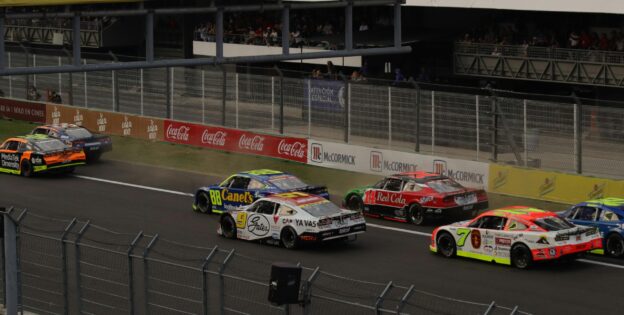Ethan Anagnos – Michael Jordan is the king of the basketball court, but it seems he has finally met his match in the courtroom- with NASCAR. In 2020, Jordan embarked on a mission to make his mark in the motorsports world by forming and becoming a co-owner of 23XI Racing, along with NASCAR legend Denny Hamlin and sports agent Curtis Polk. 23XI Racing is a motorsports team that exclusively competes in NASCAR Cup Series races. The team made its NASCAR debut in 2021, featuring one car driven by Bubba Wallace, but it has since grown quickly and now fields three cars. Although 23XI Racing has only been in NASCAR for four years, the team has been impressive, winning a total of eight NASCAR Cup Series races and making the NASCAR version of the playoffs in 2023. 23XI Racing and its owner, Michael Jordan, are now in the spotlight, not because of the team’s performances on the racetrack, but because of the lawsuit they initiated against NASCAR in the courtroom.
On September 6, 2024, 23XI Racing and Front Row Motorsports (FRM), another NASCAR racing team, were the only two out of fifteen teams to reject NASCAR’s 2025 charter agreement, thereby risking their racing future in NASCAR. The NASCAR charter agreement is a take-it-or-leave-it contract that outlines the teams that are guaranteed entry in the upcoming NASCAR Cup Series and the revenue-sharing model that will be used during the season.
A month later, 23XI Racing and FRM filed Sherman Act Section 2 claims against NASCAR in the Western District of North Carolina. The teams claimed that NASCAR has an unlawful monopoly on stock car racing and that it used “anticompetitive and exclusionary practices” to “enrich [itself] at the expense of premier stock racing teams.” Specifically, the claims center around NASCAR’s take-it-or-leave-it charter and how it unfairly puts teams in a limited bargaining position. 23XI Racing and FRM’s lawsuit came as a surprise to the NASCAR world, as this is the first time anyone or any team has challenged the charter agreement, which began in 2016.
After initiating the lawsuit, 23XI Racing and FRM filed for preliminary injunctions, which would allow them to continue competing in the NASCAR Cup Series as if they were chartered teams, until the litigation is resolved. The teams filed for the injunctions because they faced the threat of losing their drivers, sponsors, and race revenue to other teams during the time they were not on the track. After one failed attempt, the court granted both teams’ preliminary injunctions, permitting them to race in the 2025 season. NASCAR filed for an appeal, which has yet to be decided. Throughout the suit, NASCAR has maintained the position that the teams’ claims do not amount to valid antitrust claims, as the parties are just disagreeing about the terms of the charter.
In March, this case took a turn when NASCAR decided to countersue both 23XI Racing and FRM under Section 1 of the Sherman Act, asking the court to grant an injunction allowing NASCAR to revoke the teams’ guaranteed racing spots. NASCAR alleges that both teams coerced and threatened NASCAR “into meeting their demands for better [a] contract and financial terms.” The counterclaim states that the two teams violated antitrust laws by organizing anticompetitive collective conduct among the teams that signed NASCAR’s charter. More specifically, it cites an instance when 23XI Racing and FRM had other teams, not involved in this litigation, “boycott” a charter-required meeting. Additionally, NASCAR asserts that the teams’ claims are just an attempt to inappropriately use the legal system to secure better terms in the charter agreement. On the other hand, Jeffrey Kessler, 23XI Racing and FRM’s attorney, contends that the countersuit has no merit and is just being used to distract the public from NASCAR’s illegal monopolistic conduct.
Almost all major U.S. sports leagues–NFL, NBA, MLB, NHL–have gone through some sort of antitrust growing pains, and NASCAR is no different. This case could potentially change how NASCAR and other motorsports leagues conduct themselves when it comes to contracting with race teams. The impacts of this case could also stretch across other industries where large corporations offer take-it-or-leave-it contracts, leaving the “players” with limited to no bargaining power. 23XI Racing and FRM hope that winning this suit will bring more revenue and bargaining power to the teams that compete in NASCAR. NASCAR has made it clear that it has no intention of renegotiating the charter, so if 23XI Racing and FRM are successful, it is likely that the charter system will no longer exist- meaning that NASCAR and the racing teams will have to fundamentally change their method of determining what the revenue-sharing model will look like, and which teams get guaranteed spots for the season. Additionally, if the two teams win this lawsuit, it might sway other racing leagues to change how they operate to avoid any potentially illegal monopolistic conduct. If NASCAR is successful, the charter will likely remain in place, putting 23XI Racing and FRM in a tough spot as they never signed or agreed to it. This case is worth following as it has the potential to change the game in racing by giving teams more power during negotiations and the ability to ensure their long-term financial stability. Will Michael Jordan continue to be the king of the court, or will NASCAR be able to dethrone him?


